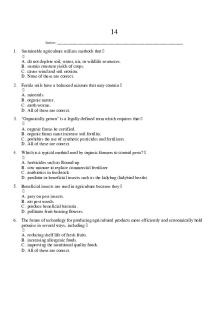Environmental Management: Concept, Types and Importance Course No. URP 3131 Course Title: Environmental Management and Planning Submitted by PDF

| Title | Environmental Management: Concept, Types and Importance Course No. URP 3131 Course Title: Environmental Management and Planning Submitted by |
|---|---|
| Author | Mehedi Mudasser |
| Pages | 7 |
| File Size | 572.1 KB |
| File Type | |
| Total Downloads | 4 |
| Total Views | 57 |
Summary
Course No. URP 3131 Course Title: Environmental Management and Planning Environmental Management: Concept, Types and Importance Submitted by #110412 Date of Submission: 17th March, 2014 Environmental Management: Concept, Types & Importance Concept of Environmental Management Environmental manage...
Description
Course No. URP 3131 Course Title: Environmental Management and Planning
Environmental Management: Concept, Types and Importance Submitted by #110412
Date of Submission: 17th March, 2014
Environmental Management: Concept, Types & Importance Concept of Environmental Management Environmental management comprises two terms: environment and management. So at first, we have to know, what management is. Then we can easily understand about the environmental management. Management Management is the process which comprises of planning, designing, controlling, coordinating, staffing or leading to acquire a desired objective. At first, one views about management functionally, such as measuring quantity, adjusting plans, meeting goals. This applies even in situation where planning does not take place. From this perspective, Henri Fayol considers management to consist of six functions:
Forecasting Planning Organizing Commanding Coordinating Controlling (Wikipedia, Whatever, everyday we are managing everything, every idea. It leads the proper to reach the 2014) desired goal. Environmental Management Environmental management system is a systematic approach of planning, designing, coordinating, leading and controlling all the activities and what objectives/ functions of any entity to have a desired outcome in terms of enhancing environmental quality. Objectives of Environmental Management In practical point of view,
We want a healthy living environment. To ensure it we have to remove all kinds of pollution or environmental media. In situ management: where we find problem, we manage here.
Two angle of views in management,
Separate the source and receptor and keep a buffer zone between them as it works like sink. This zone can be physical or by distances. Its goal is to create buffer zone.
1|Page
This view is not in situ management. It is mainly the task of urban manager or urban planner. He locates services in separate zones. In economists view, there is misallocation of resources. The purpose is to protect the all services from pollution. But for this reason number of trip generation become high. So the fuel from transport pollutes the environment. So there are presence of merits and demerits. It is the concept of Americans because of huge area and low density.
Types of Environmental Management Generally there are two types of management. I. II.
Reactive Management Proactive/ Anticipatory/ Visionary Management
These are explained below: I.
Reactive Management
This is the type of management where decisions are made absolutely and only in response or reaction to a problem or opportunity-where no action is taken to prevent problems or create opportunities, and very rarely is anything planned or initiated by the manager. Characteristics:
Suspicious of new ideas Competition among managers Restricted flow of information General focus on staff and customer/ service-user needs Internal initiatives are direct reaction to available resources. As the initiatives are separate from each other they could be poor at coordination. Generally small organizations take this type of management. So, sometimes some unexpected causes harm the reactive management process. II.
Proactive/ Anticipatory Management
This is the type of management where the possibility of problems or opportunities is exclaimed, where the manager thinks ahead, initiatives action, and therefore takes the lead in preventing problems, creating possibilities and projecting the interests and needs of his/ her staff and his/ her areas of accountability and responsibility. Characteristics:
Open the new ideas Trust among managers Open flow of information Support for people who show initiative 2|Page
Clear and specific focus on staff and customer/ service-user needs Higher level of staff satisfaction. Careful coordination of new initiatives with existing commitments Generally larger organizations take this type of management. But there is a serious problem may be raised due to uncertainty.
Uncertainty is the big disadvantage of anticipatory management. The long term environmental management plan can be collapsed by uncertainty. Every large productive organization has to predict what should be the level of uncertainty. So there is needed to be mentioned the types of uncertainty. There are three types of uncertainty. These are explained below: o Political Uncertainty Suppose, a large institution has developed some chimneys under a proper management which is created by that institution following the rules of the government. This institution has purchased sophisticated equipment and to run the equipment under the management employed skilled laborers. It also set up a system to regular monitor how much air and water pollutants discharged from these chimneys. Whatever, if the government has changed the policy level will also be changed. As a result, the whole management will be changed. For example, the past government permit 100 metric ton pollutants per hour (discharging level). But the next government rule, it needs more production. Environment is her second priority. To produce that amount the institution has to discharge 125 metric ton per hour. So the whole management will have to be renewed. Tis is political uncertainty. o Technological Uncertainty A large institution sometimes goes into the management system for such as government pressure, to build up the customer relation through showing to the customers that it performs environmentally well. So it will manage the technology. Suppose, it has used as expansive technology but for unawareness and some reasons people are not attracted to that product. But after 1 year, 2 year people are known about that technology. So the first institution is collapsed and other institutions used this technology after 1 or 2 years and made profit. o Trade Uncertainty Suppose, a company has produced only one product which is global market oriented. If anyhow the global market price for that product is decreased the product will not be exported. So, it’s a kind of global trade uncertainty.
Examples of Environmental Management System The purpose of included examples is only for understanding the pattern of different environmental management system. Here we include the residential environmental management system and the 3|Page
difference between residential environmental management and corporation environmental management to show the difference between large and small scale management. Residential Environmental Management System
Routine Environmental Tasks (Some daily tasks); e.g. Daily threshed out Operational/ Technical Environmental Management (Some tasks which are not routine environmental tasks but occurs after a frequent time); e.g. Sweeping Strategic Environment Activities (Some tasks which are occurred after a long time span); e.g. Fan, window, ladder cleaning etc. Purpose: To protect my health and hygiene and to protect my home in terms of enhancing environmental quality and durability.
Main difference between Residential Environmental Management and Corporation Environmental Management: To protect my health and hygiene and to protect my home in terms of enhancing environmental quality and durability. Not to protect its employee, its own establishment or occupational environment. They ensure to protect the health hazard of people living around, to protect the negative impact of water system in around, and to protect the air quality in surrounding vicinity. It has the power to protect itself as well as the surrounding area from pollution. But the residential environmental management has no headache for surrounding area; it only protects itself.
Importance of Environmental Management It's easy to take for the granted the importance of environmental management. However, its economic and intrinsic value cannot be overstated. Environmental management occurs at all levels--from a city park's native prairie garden to grand scale projects such as management of vast wetlands like the Everglades. State and federal agencies work hand-in-hand with non-profit agencies such as the Nature Conservancy and Defenders of Wildlife to acquire and manage resources. Restoration and preservation are key components to resource management. (By Chris Dinesen Rogers, 2014)An environmental management system addresses the environmental impact of an organization's activities and establishes goals and procedures that will improve the impact it has on the environment and human health. (By Julie McMurchie, 2014) Pearson recognizes that that our day-to-day operations have an environmental impact and that we have a responsibility to manage and measure this impact. Good environmental management brings many benefits:
Consistent with our company values of being brave, imaginative and decent Improved environmental and reputational risk management Cost savings Meeting stakeholder expectations of what constitutes a well-run, responsible business 4|Page
Ensuring compliance with relevant environmental laws, regulations and codes Reflects our commitment as a signatory to the Global Compact principles on labour standards, human rights, environmental responsibility and combating corruption. (EMS, 2014) Whatever, environmental management is so much important in our day to day life. The proper environmental management in a proper way can save the earth and create more sustainable for living.
5|Page
References By Chris Dinesen Rogers, e. C. (2014, March 7). The Importance of Environmental Management. Retrieved from eHOW: http://www.ehow.com/about_5434664_importanceenvironmental-management.html By Julie McMurchie, e. C. (2014, March 7). Importance of Environmental Management System. Retrieved from eHOW: http://www.ehow.com/facts_6804978_importanceenvironmental-management-system.html EMS, G. (2014, March 7). Global EMS. Retrieved from Environmental Management System: http://www.pearson.com/content/dam/pearson-corporate/files/enviro- reports/ Global_EMS.pdf Wikipedia. (2014, March 7). Management. http://en.wikipedia.org/wiki/Management
Retrieved
from
Wikipedia:
6|Page...
Similar Free PDFs

Planning and Project Management
- 61 Pages

Environmental Science and Engineering
- 109 Pages

Environmental question and answer
- 122 Pages
Popular Institutions
- Tinajero National High School - Annex
- Politeknik Caltex Riau
- Yokohama City University
- SGT University
- University of Al-Qadisiyah
- Divine Word College of Vigan
- Techniek College Rotterdam
- Universidade de Santiago
- Universiti Teknologi MARA Cawangan Johor Kampus Pasir Gudang
- Poltekkes Kemenkes Yogyakarta
- Baguio City National High School
- Colegio san marcos
- preparatoria uno
- Centro de Bachillerato Tecnológico Industrial y de Servicios No. 107
- Dalian Maritime University
- Quang Trung Secondary School
- Colegio Tecnológico en Informática
- Corporación Regional de Educación Superior
- Grupo CEDVA
- Dar Al Uloom University
- Centro de Estudios Preuniversitarios de la Universidad Nacional de Ingeniería
- 上智大学
- Aakash International School, Nuna Majara
- San Felipe Neri Catholic School
- Kang Chiao International School - New Taipei City
- Misamis Occidental National High School
- Institución Educativa Escuela Normal Juan Ladrilleros
- Kolehiyo ng Pantukan
- Batanes State College
- Instituto Continental
- Sekolah Menengah Kejuruan Kesehatan Kaltara (Tarakan)
- Colegio de La Inmaculada Concepcion - Cebu












